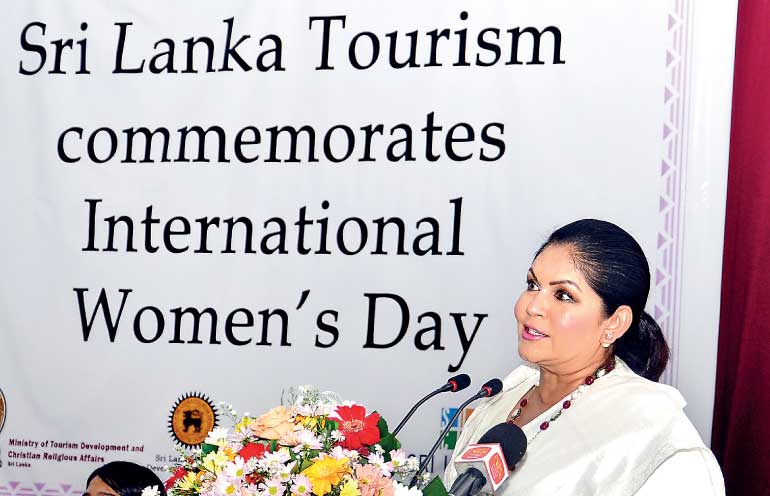Monday Feb 23, 2026
Monday Feb 23, 2026
Monday, 5 March 2018 00:00 - - {{hitsCtrl.values.hits}}

By Charumini de Silva
In a tough talk on the Coalition Government’s effort to establish 25% female representation in public administration, Colombo Mayor-elect Rosy Senanayake last week criticised the attitude of the Election Commissioner and party leaders, noting that they were now in the midst of creating a whole new drama.
“On 10 February we were making history in Sri Lanka. Thanks to Prime Minister Ranil Wickremesinghe for the very first time 25% women representation in the local councils was made mandatory. It has been almost a month and it is a struggle for political parties to get the Election Commissioner to implement it,” she said at the first-ever Women’s Day Celebration organised by the Tourism Development Ministry in Colombo.
Senanayake emphasised that the Election Commissioner firmly reiterated to all parties that nomination lists had to have 10% on the vote system and 50% on the proportional representation system, while noting that those political parties that failed to comply with this criteria would be cancelled.
However, she claimed the situation had now changed where the Election Commissioner was taking “no action” to implement the law and support the Government’s initiative to establish 25% women representation at Local Government Councils.
“He is now sitting there, getting bogged down and influenced by political party leaders. This is simply because the senior male members of the party have lost and the party leaders are now saying 50% women is too much, these women hadn’t been in politics before and now this is a whole new drama and a new cup of tea for all,” Senanayake charged.
Outlining that female representation in the public administration of the country was appalling, she stated that in spite of having Local Government Councils for over 50 years, female representation was only 2%. According to her, female representation has not gone beyond 5% at the national or provincial level, while at the local level it has remained below 2%.
Senanayake said that the authorities were now looking for excuses to avoid appointing women to the councils.
“They are looking for different possible laws that might be contradicting, disregarding the major law which states 25% women is mandatory. This is the mindset. The commencement of the councils will get further delayed now,” she claimed.
Noting that the councils should have actually started operations on 15 February, Senananyake said: “It has delayed to the point, I don’t see us taking note that it has been almost one month since the elections were over, simply because parties are now debating how many women, who are the women or should we actually bring the men who lost on the list. This is the mindset when it comes to promotions, employing women, when women are given a liability — I strongly believe we need to change this attitude.”
Highlighting that women form the majority of Sri Lanka’s population, numbering around 10.9 million as opposed to 10.1 million males, she stressed the Sri Lankan authorities must pay attention to women’s rights if the country was truly democratic.
“Major political parties or leaders, when they talk about changing the Constitution or bringing in changes to the electoral system, they constantly concentrate on minority parties, their people and everything else to do with minorities — but do they ever consider the majority of the population in this country are women? If we are to see a truly democratic country, then the majority has to be heard,” Senanayake added.
Tourism Development and Christian Religious Affairs Minister John Amaratunga also said the Government’s efforts to establish female representation in public office sadly now seems to be an issue, as many of the councils lack 25% female representation.
“At the national level it is an even sadder story, with only 13 female Members of Parliament currently. Out of this the United National Party (UNP) has seven members followed by the United People’s Freedom Alliance (UPFA) with five members and one member from the Illankai Tamil Arasu Kachchi (ITAK),” he pointed out.
Amaratunga said incidentally female representation in the nation’s supreme legislature of Parliament has remained at 13 during the last three consecutive parliaments since 2004.
“This is also the highest number of female representation our Parliament has ever had at a given time. With males occupying 212 of the seats in the 225-seat legislature the 13 females are a clear yet determined minority,” he said.
Despite speaking and writing firmly to all possible authorities and party leaders on this matter, Senanayake said it was unfortunate that the women had taken a backseat in this initiative. “I have written and spoken to the Election Commissioner very firmly and to some of our leaders as well, but I don’t see the women fighting for their rights. Where are the women? This is the saddest thing,” Senanayake said.